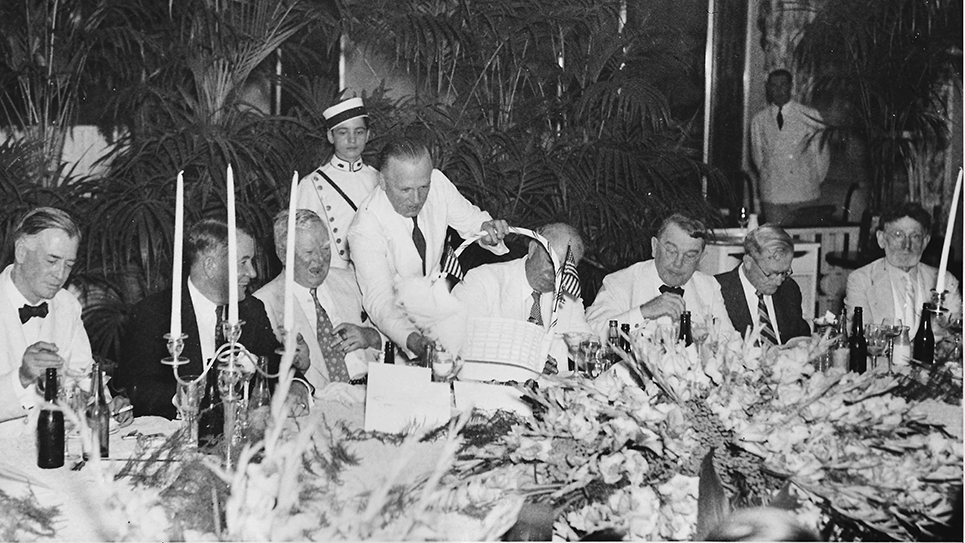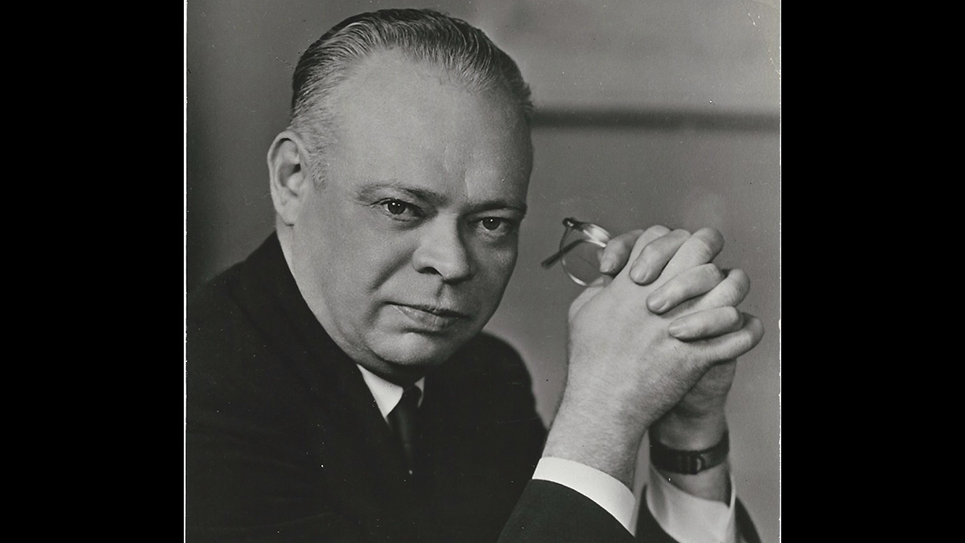The Fight for Majority Leader, 1937
Sometime during the night of July 14, 1937, the heart of Joseph T. Robinson stopped beating. Arkansas had honored Joe Robinson with every distinction she could bestow upon a single individual, electing him to Congress, the governorship and finally, the United States Senate. Once inside the U. S. Senate, the people of Arkansas had kept Joe Robinson there where he accrued seniority and influence. When the Democrats swept the 1932 elections and gained a majority inside the Senate, Robinson became the majority leader and wielded real power. For much of that time, Robinson wielded that power not necessarily as much on behalf of the people of Arkansas, but rather for President Franklin D. Roosevelt and his New Deal. A corporation lawyer by vocation, Robinson had misgivings, if not mixed feelings, about the New Deal legislation. Yet Robinson had seen the misery and human suffering wrought by the worst of the Great Depression and the people of his own state. While Arkansas was almost entirely a rural and agricultural state, Senator Robinson had been aghast when President Herbert Hoover seemed indifferent to the suffering of people. The sharp-tongued Arkansan thought Hoover was more concerned about livestock than human beings. Robinson was delighted by the defeat of Herbert Hoover by Franklin Roosevelt, and he did all he could to help the newly elected president.
Joseph T. Robinson had been one of a handful of congressional leaders summoned to the White House by Roosevelt where the president proceeded to announce his intention to add more justices to the United States Supreme Court. Like most of his fellow congressmen, Robinson said little or nothing. Hatton Sumners, the crusty Texas bachelor who chaired the House Judiciary Committee, told his colleagues in the car on the way back to the Capitol, “Boys, here’s where I cash in my chips.” The determined opposition of Sumners to Roosevelt’s plan to pack the Supreme Court meant the fight had to begin in the Senate. There the Democrats had a lopsided majority: In 1937, there were only sixteen Republican senators out of ninety-six. To spur Robinson on, FDR dangled before the majority leader the honor he still craved the most: a seat on the bench of the U. S. Supreme Court. Privately, Roosevelt thought Robinson would be too conservative a justice, but thought it well worth the bargain to extract enough justices to allow him to appoint additional liberals to the court bench.
With the president’s announcement, the Democratic Party was instantly torn asunder. Charles McNary, the wily minority leader, immediately saw the distinct advantage of division in the ranks of the Democrats. He quietly instructed the GOP senators to let the Democrats fight amongst themselves. Republican senators were solidly opposed to the court-packing scheme but said little. Even former President Herbert Hoover was eventually browbeaten into silence.
The leader against the court packing plan was Burton K. Wheeler of Montana, a progressive who at one time had been labeled “Bolshevik Burt” by political opponents in his home state. By every standard, a true political maverick, Wheeler had bolted his own party to accept the vice-presidential nomination of the Progressive Party, which outran the Democratic presidential ticket in many of the Western states. Impossible to intimidate, Wheeler was an excellent speaker and proved to be a good tactician for those senators against the court packing plan. Even some of those reluctantly supporting the plan did so only because of their personal affection for and loyalty to Joe Robinson, whom they wished to see sit on the Supreme Court.
When Joe Robinson died, so did Franklin Roosevelt’s plan to pack the Supreme Court. A host of senators rode the funeral train carrying the late majority leader’s body back home to Arkansas. The compartments were a beehive of political activity, which included Vice President John Nance Garner, the poker-playing, whisky-drinking, cigar-chomping Texan who disliked Roosevelt’s court packing plan as much as many of the senators. Once leaving the floor of the United States Senate, the colorful vice president held his nose with one hand and gave the thumbs down signal with the other during the debate over the packing plan.
A fight was shaping up to fill Joe Robinson’s seat as majority leader. Alben Barkley, the amiable senator from Kentucky, had been Robinson’s assistant leader in the Senate and enjoyed broad support from many of his fellow senators. Pat Harrison of Mississippi was one of the true heavyweights of the United States Senate at the time. Chairman of the enormously powerful Finance Committee, rotund and balding Pat Harrison was an inveterate golfer and much sought-after companion by his friends. Almost always found with a lit cigar in one hand, Harrison was shrewd, able and had as many friends inside the Senate as Barkley, if not more. Although Senator Harrison had largely been a wheelhorse of the Roosevelt administration, many New Dealers worried about the Mississippian’s innate conservatism, at least financially. Even President Roosevelt worried about Harrison’s independent streak. From the very beginning, it was clear whom President Roosevelt preferred to see elected majority leader. The day after Joe Robinson’s death, Roosevelt dispatched a letter to Barkley, and its salutation of “Dear Alben” became a mockery in the mouths of the Kentuckian’s opponents. The letter was an ill-disguised endorsement of Barkley for Senate Majority Leader. In truth, the letter and its greeting embarrassed Barkley and disgusted more than a few senators. The letter urged Senator Barkley to pick up where Joe Robinson had left off and pass Roosevelt’s court packing scheme. Nor was FDR any too subtle in referring to Barkley as the Senate’s “acting majority leader,” a designation never given him by his colleagues.
Longtime Washington observers thought Pat Harrison the favorite to win the majority leader’s post. Harrison had been in the Senate longer, arriving in 1918 after having defeated James K. Vardaman, who had once been the most popular officeholder in Mississippi. Alben Barkley had come to the U.S. Senate in 1927 after having beaten Republican incumbent Richard Ernst. Harrison’s chairmanship of the Finance Committee gave him a leg up in the contest. Naturally, Pat Harrison was profoundly unhappy with President Roosevelt’s “Dear Alben” letter. The day after Roosevelt’s “Dear Alben” letter arrived, Senator Pat Harrison was at the White House where President Roosevelt solemnly assured the Mississippian he was keeping a “hands off” attitude in the contest. Of course, it was not at all true.
While Roosevelt benignly insisted he was neutral in the increasingly competitive race between Pat Harrison and Alben Barkley, the administration worked hard to corral U.S. senators into supporting the Kentuckian. One such example was the White House contacting Tom Pendergast, the leader of the political machine that had helped to put Harry Truman in the U.S. Senate, to bring his influence to bear on behalf of Barkley. The scrappy little man from Missouri was already committed – – – to Pat Harrison – – – and told Boss Pendergast he had given his word to back Harrison and wouldn’t break it. Pendergast, to his credit, didn’t try and force the issue and knew what it meant when Truman had given his word. The Kansas City boss reported jovially back to the Roosevelt White House that Truman was as contrary as the worst Missouri mule and there was nothing he could do about it. Rumors continued to circulate about jobs and projects for the constituents of senators being granted from the White House.
Senators disliked the interference of the president in what they rightly considered to be solely a matter for the Senate to consider. Several presidents have made the mistake of attempting to influence leadership contests in the U. S. Senate with little good result. Alben Barkley tried to put Roosevelt’s interference in the majority leader contest in the best light, saying, “If being loyal to the greatest president is hanging on his coattails, I’m proud to hang on.”
As the vote for selecting a new majority leader approached, it became obvious the contest was as close as could be. Harrison was told by friends the deciding vote could very well be his junior colleague from Mississippi, Theodore G. Bilbo. Harrison and Bilbo did not get along. Senator Bilbo had done everything he possibly could to dislodge Harrison from the United States Senate when he had backed Governor Mike Sennett against him in the 1936 Democratic primary. Harrison had thrashed Sennett but the senator remained boiling mad at his colleague and ignored his presence and absolutely refused to utter a single word to Bilbo. Approached to vote for Pat Harrison, Bilbo replied he would if Harrison would speak to him. When told of Bilbo’s offer, Harrison was quiet for a moment, before thundering, “I wouldn’t speak to the son-of-a-bitch if it meant the presidency of the United States!”
In the meantime, the Roosevelt administration did everything it could to whittle down the expected Harrison majority. Offers of patronage flowed out of the White House and it had an effect.
Tennessee’s senior United States senator, Kenneth McKellar, while a friend of Pat Harrison, was a stalwart of the New Deal and a warm personal friend of Alben Barkley. When Democratic senators met inside the Senate’s elaborate Caucus Room in the old Senate Office Building, both Barkley and Harrison selected tellers to count the votes. Barkley chose McKellar as his vote teller. Senators wrote their choice in their own hand, folded the slips of paper, walked by the tellers and placed them in Senator Carter Glass’s battered old Panama straw hat. Harry Truman carefully wrote out “Harrison” on his own ballot and made a point of showing it to those sitting nearby. There would be no question about whether or not Senator Truman had kept his commitment to Pat Harrison.
As the names were called out, the race between Pat Harrison and Alben Barkley was neck-and-neck. The score was tied when the tellers prepared to announce the final vote. The tension was such that Barkley bit the stem of his briar pipe in two. The last vote was for Alben Barkley, who had won 38-37. Barkley rose and announced, “I will act as a sort of glorified messenger boy to the best of my ability.”
The contest and President Roosevelt wanting a majority leader of his own choice left in its wake more bitterness than the court packing fight. It left permanent scars. In August of 1937 Democratic senators came together for a dinner to fete Barkley as majority leader, but it was also an attempt to restore harmony to the caucus. The menu was soothing enough; senators feasted upon stuffed squab, salad Texas Ranger, and a dessert labeled “coupe harmony,” which was a peach soaked in brandy with layers of vanilla ice cream, raspberry ice, and chocolate ice cream all in a champagne glass. White doves made of sugar were the order of the evening and real doves were symbolically released at the dinner, to the consternation of some guests. One of the two doves released that evening made itself at home by perching upon a beam in the ceiling where it was content to remain as the speeches began.
The seating was strategic; Senator Barkley sat to the right of Vice President John Nance Garner, while Pat Harrison sat to the left of the toastmaster. Beside Harrison was Tennessee’s Senator Kenneth McKellar. The effort to restore amity and harmony amongst Senate Democrats was due not only to the fight between Pat Harrison and Alben Barkley for the leadership of the caucus but also because of the lingering bitterness left by the fight over Roosevelt’s court packing scheme.
While harmony was the order of the evening, it was mostly on the surface. Senator William King of Utah, who left early, described the event as a “love feast.” Yet Democrats remained divided while FDR remained petulant. The president tried his “purge” in the primaries the following year and after the 1938 election, a coalition of more conservative Democrats and Republicans would become powerful inside both houses of Congress.
© 2023 Ray Hill







